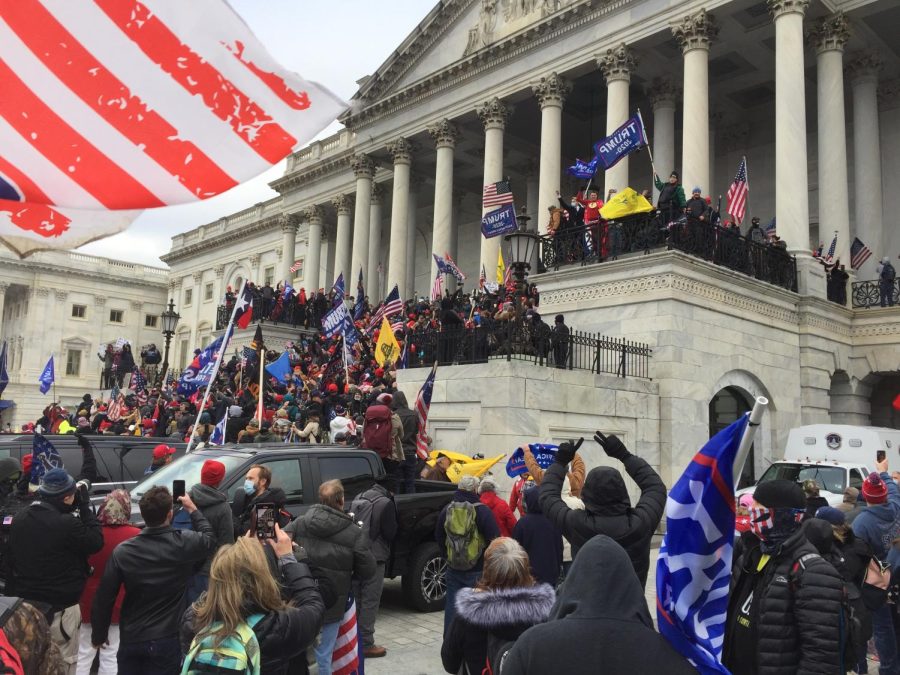On Jan. 6, 2021, I tried to write a story.
I wanted to detail the profound disgust I felt watching “patriots” beating capitol police and infiltrating the offices of elected officials. I wanted to describe how I felt as a young person in the United States that day. I wanted to rationalize the events that had led us to this point. Ultimately, it ended up being less of a story and more of an enraged ramble that likely nobody would have understood.
Here we are, a year later, and I still don’t fully understand the events of Jan. 6. And to be fair, I likely never will. It’s pretty baffling that over 700 people stormed the Capitol, posing for pictures in some of the most prestigious offices in the country and defacing federal property. What I do know is Jan. 6 is just one manifestation of an issue that has bubbled beneath the surface of this country for years.
Political polarization refers to the extent to which groups are divided on a certain issue and often entails an increase in division over time. It’s especially prevalent when it comes to political parties. It’s important to note that political polarization has been on the rise in the U.S. for years. According to the Pew Research Center, “77% of Americans said the country was now more divided than before the (COVD-19) outbreak.”
We’ve become fixated on what divides us instead of what unites us. We can’t find common ground because we’re so determined to fight those we disagree with. It’s us against them.
That’s what planted the seeds for the Capitol riot.
We’re living in a political sphere that deals only in extremes, and there is nowhere these extremes are more prevalent than in the U.S. Congress — particularly, the committee investigating the events of Jan. 6. As more details from the event are uncovered, so are the deep political divides that hindered the committee’s investigation.
The Select Committee to Investigate the January 6th Attack on the United States Capitol has been tasked with investigating the events that led up to the Capitol riot. The committee has interviewed over 300 witnesses, served 50 subpoenas, obtained 35,000 pages of documents surrounding the events of the capitol riot, and charged two officials from the Trump Administration with contempt of Congress for failing to comply with such subpoenas.
Although this seems like progress, the investigation is continuously hindered by what can only be described as a political minefield. According to the Washington Post, “Trump and his GOP supporters continue to charge that the inquiry is an overtly partisan exercise designed to undermine Trump and his allies.”
It’s been 365 days since the Capitol riot, yet somehow, it does not feel like the fighting has ceased since that day. What was intended to be an investigation into the insurrection has become another arena for the political battles.
Reflecting on Jan. 6 has made some things incredibly clear. It’s clear we, the student body, are the only people capable of truly bridging the divides that have taken over our political realms.
Going forward, it’s essential we work together to prioritize the truth, not just in the events of Jan. 6, but in all the struggles we face. Our divisions are no longer just opinions clashing, they’re disputes of objective facts. We can disagree on a thousand different things, but a fundamental part of combating polarization is facing the truth.
All those things I felt about Jan. 6 — the anger, the shame, and the disgust — were overwhelming.
However, 2021 allowed me to learn from this moment in our history. I was willing to let all the anger and shame I felt about the riot cloud my opportunity to reflect and grow. I can only hope we move past all the anger and hate that fueled Jan. 6 and move towards bridging the gaps that have divided us for too long. The first anniversary of the Jan. 6 riot is just another reminder it is imperative we grow into a generation that is more united than ever before.




























































